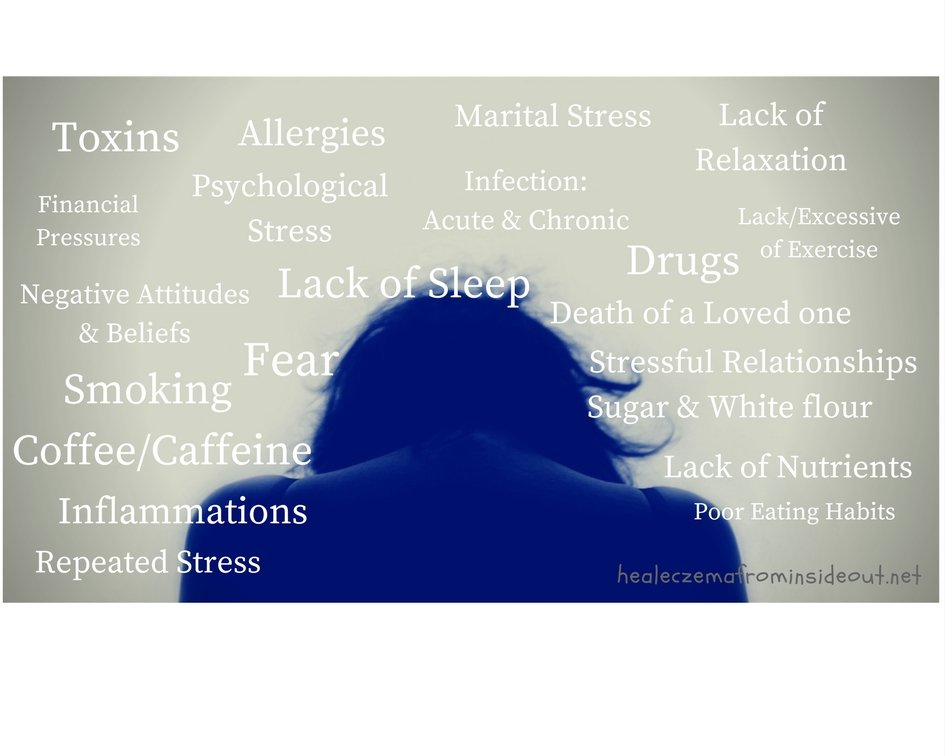Hypoadrenia and Adrenal Fatigue
“hypo” (lower) and adrenia (related to the adrenals) is a lowered adrenal activity causing a decrease in the output of adrenal hormones, particularly the steroid hormone called cortisol. Too much physical, psychological, and/or environmental stress can deplete the function of your adrenals.
This hypoadrenia can range in severity. The extreme low end of hypoadrenia is called Addison’s disease which can involve actual structural and physiological damage to the adrenal glands and is life threatening if not treated.
On the other hand, conditions towards almost normal end of hypoadrenia on the spectrum have many names such as non-Addison’s, sub-clinical hypoadrenia, neurasthenia, adrenal neurasthenia, adrenal apathy, and adrenal fatigue.
They are more commonly known as adrenal fatigue as it describes the chief symptom of hypoadrenia.
In spite of millions of people in the U.S and around the world affected by adrenal fatigue, it is not usually recognized by modern medicine nor be considered a medical emergency. Nevertheless, every organ and system in the body is more profoundly affected by the reduction of adrenal function. Changes occur in body’s metabolism (slows down), electrolyte balance, sex drive, and even body shape. our body does its best to to compensate for under-functioning adrenal glands.
Adrenal fatigue s a collection of signs and symptoms. It is not readily identifiable entity like acne or a growth on the skin. People with adrenal fatigue often look and act relatively normal as they may not have any obvious signs of physical illness. Yet, they know that they are not well and live with “gray” feelings. They often use coffee and/or other stimulants to get going in the morning and throughout the day.
Conditions related to Adrenal Fatigue
- Abnormal blood sugar levels (Hypoglycemia)
- Alcoholism
- Arthritis
- Asthma
- Autoimmune Disorders
- Constipation
- Cravings for salty or sugary foods, alcohol, caffeine, energy drink
- Depression
- Fibromyalgia
- Frequent Allergies
- Frequent Colds
- Frequent Respiratory Infections
- Increased difficulty during menopause
- Increased Fears, Anxiety, and Depression
- Insomnia
- Intense Mood swings
- Low energy
- Low sex drive
- Premenstrual Tension
- Thyroid disorder
- more
Factors affect Adrenal Fatigue
Whether in a mild or severe form, adrenal fatigue is usually caused by some form of stress. Our body doesn’t differentiate a type of stress. Every kind of stress, physical, emotional, psychological, environmental (external), infectious (internal), or a combination of these is responded the same by our adrenals.
While stress can be caused by significant events such as an automobile accident, or the death of a loved one, the lower grade (less intense) stress such as pressure at the workplace, an unhappy relationships, environmental toxins, poor diet, occasional financial crisis, etc. could take its toll. Especially, if occurs simultaneously, accumulate or become chronic, and adrenals have no opportunity to fully recover, adrenal fatigue is usually the result.

Anyone can experience Adrenal Fatigue
While people from every culture and every age can suffer from adrenal fatigue, each person has a different capacity to handle the total stress load, and the capacity of each person varies over time and events.
One person may handle and overcome a stress quite easily and be ready for more, but another person, or that same person at a different situation, may find the same stress overwhelming and impossible to bear. It is important to understand that the onset and continuation of adrenal fatigue is reflected by great individual variation.
Your Job may be a Factor
Some professions are harder on the adrenal glands than others such as physicians, the police force, middle executives, secretaries, and teachers. cabin attendants, actors and actresses, etc. They often sacrifice their sleeping hours, have intensive work load, and requires high responsibility. They commonly have other health problems (high cholesterol, insulin resistance, hypertension, obesity, etc.), as the adrenals are less responsive after burning out of cortisol.
Components of Lifestyle Leading to Adrenal Fatigue
- Lack of sleep
- poor food choices
- Using food and drinks as stimulants when tired
- Staying up late even though exhausted
- Constantly driving yourself
- Trying to be perfect
- Feeling stuck
- Lack of enjoyable and rejuvenating activities
Lifestyle Leading to Adrenal Fatigue
- University student
- Mother with two or more children with little support from family or friends
- Single parent
- Unhappy marriage
- Extremely unhappy and stressful work conditions
- Drug or alcohol abuser
- Alternating shift work that requires sleep pattern to be frequently adjusted
- Little play little recharging time
Life Events Leading to Adrenal Fatigue
- Pressure or frequent crises at work and/or home
- Severe emotional traumas that are unresolved
- Death of a close friend or family member
- Major surgery with incomplete recovery
- Prolonged or repeated respiratory infections
- Serious burns (include sunburn)
- Head trauma
- Loss of stable job
- Sudden change in financial status
- Relocation without support
- Repeated or overwhelming chemical exposure including drugs and alcohol abuse
Genetics
We can never forget to consider the weaknesses on adrenal glands from birth on, besides those factors of lifestyle and life events.
Children born to mothers with adrenal fatigue and children experience severe stress in the womb typically have lower adrenal function. For this reason, they have less capacity to deal with stress in their own lives and more prone to adrenal fatigue throughout their lives.
Do I Have Adrenal Fatigue?
If you are experiencing the lifestyle that I listed above, and some conditions seem familiar to you, go click on “questionnaire” to assess your level of adrenal fatigue.
Take => Questionnaire for Adrenal Fatigue
Read “Nutritional Supplements for Adrenal Fatigue“.
Reference:
James L. Wilson, N.D., D.C. PhD. “Adrenal Fatigue The 21st Century Stress Syndrome”




No Comments